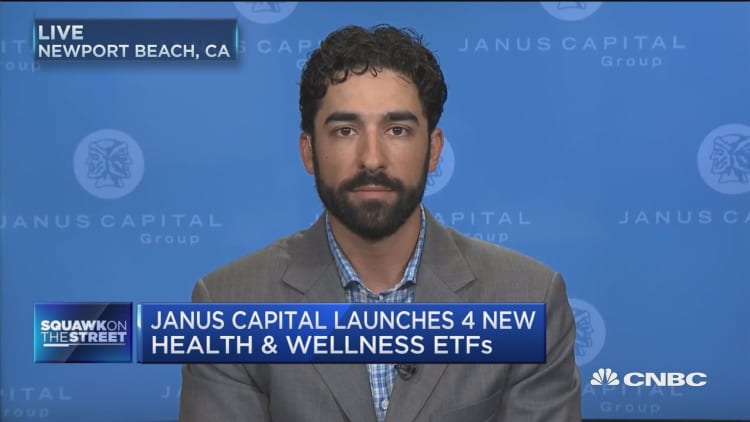Most people are painfully aware of the staggering health-care costs they're likely to face in retirement, and most are pretty worried about it — as they should be.
For a 65-year-old healthy couple retiring this year, the average cost for health-care — including medical, dental and vision — is $394,954 (assuming they're covered by Medicare Parts B and D and a supplemental insurance policy). For a 55-year-old couple retiring in 10 years, the number jumps to $463,849.
According to one study, 74 percent of American couples are worried about being able to afford unexpected health-care costs in retirement. However, 37 percent have yet to consider the impact of potential health-care costs on their retirement savings and just 22 percent have factored it into their retirement plan.
Part of the problem is that people are unaware of the options available to them. Another is that the options that exist tend to be complicated and costly. However, experts say it's important to research your options and plan accordingly to avoid depleting the retirement funds you worked so hard to accumulate.
Marguerita Cheng, a certified financial planner and CEO of Blue Ocean Global Wealth, said that "everyone needs a plan for how they are going to handle long-term care." They need to consider who will provide the care, where they will receive it and how they will pay for it, she added.
"It can be really confusing," Cheng said. "Not every option is going to be right for you. … The key is to do what's most appropriate for your situation."
Here's a look at some of the available approaches.
Long-term care insurance. Long-term care insurance is designed to cover, for a set period of time, health-care-related expenses such as at-home care or assisted living, which may not be covered fully (or at all) by other types of insurance.
Michael Resnick, a CFP with GCG Financial, believes LTCI can be a useful way to protect retirement assets, at least in some cases.
Everyone needs a plan for how they are going to handle long-term care.Marguerita ChengCEO of Blue Ocean Global Wealth
"I have a client whose husband did almost everything right in planning for retirement," he said. "The one thing he missed in his retirement planning was long-term care insurance, and now he has dementia and his wife was forced to put him into a facility. Now the wife is concerned that she may not be able to afford to stay in her home," he added.
While LTCI could have worked here, Resnick said, it is not a simple purchase. The costs are high, and the different structures and policy options are confusing. Also, there's no guarantee your premiums won't increase, which is too risky a proposition for some.
Hybrid policies. As an alternative, some advisors recommend a hybrid that combines either LTCI with a life insurance policy with a cash value that could be used toward long-term care or buying an annuity with an LTC rider that could cover a predetermined monthly cost for a set period of time.
The upside of these policies is that the premiums won't increase. They also kill two birds with one stone, since money that isn't used toward health care can be left to beneficiaries.
However, they are also complicated, can be less flexible than standalone LTCI policies, and because you're getting two products, they cost even more.
Medicaid planning. Many people rely on Medicaid to cover their long-term care costs. The problem is that you can only qualify for Medicaid once all of your other assets have been depleted, which means having nothing left to supplement your care or to leave for your beneficiaries.
According to Chris Chen, a CFP with Insight Financial Strategists, one way to preserve your assets and still qualify for Medicaid is to set up a "Medicaid-proof trust" that puts your assets in an irrevocable trust to be passed on to your heirs when you die.
A trustee has to be appointed to control the assets, which means they could be used to supplement care. However, it's entirely up to the trustee to decide, so there's no guaranteeing it.
Chen said these trusts primarily appeal to middle-net-worth people who want to preserve their assets and not "waste" their money on LTCI premiums. He added that these trusts are complex and need to be written to the specifications of laws and regulations to be effective.

Also, he said, the assets need to be moved into the trust five years before applying for Medicaid; otherwise, you won't qualify and will have to wait until the five years have passed.
Self-insuring. Self-insurance, or paying your health expenses out of pocket, may be an option for some high-net-worth individuals, but it can be risky.
Brad Rosley, a CFP and founder of Fortune Financial Group, said for people who self-insure it "means not spending, and enjoying the money they saved when they were younger in the hope of enjoying during retirement."
He added: "It also means potentially spending down the nest egg they hoped to pass on to their heirs if they end up needing the money for long-term care."
In addition, you need to be aware that there could be major tax implications and penalties involved if you are liquidating positions in stocks, bonds or in a qualified plan such as an individual retirement account or a 401(k) plan in order to pay your medical bills.
Reverse mortgage line of credit. Tapping into home equity is another way for some people to fund their care. This could mean selling a vacation property, downsizing a primary home or moving in with a relative and using the proceeds from the home sale.
Another alternative, which Tom Davison, a CFP and special projects coordinator for Summit Financial Strategies, recommends, is a reverse mortgage line of credit.
"It can be held as a 'standby' line of credit, just as many have used home equity lines of credit," he said, adding that when the funds are needed, they come out tax-free, since they are loan proceeds.
Also, he said, "the borrowing power grows with time and can't be canceled as long as the homeowner is in the home and remains current on basic obligations."
While there are one-time up-front setup costs, he said, LTCI premiums are required every year and have been going up at noticeable rates.
Like death and taxes, long-term health-care expenses are becoming another certainty in life. While deciding how to pay for them isn't always easy, not doing so could jeopardize your plans for an otherwise comfortable retirement.
— By Jennifer Woods, special to CNBC.com




